

 Jody Johnson County Director
Jody Johnson County Director




 Jody Johnson County Director
Jody Johnson County Director

I believe in people and their hopes, their aspirations, and their faith; in their right to make their own plans and arrive at their own decisions; in their ability and power to enlarge their lives and plan for the happiness of those they love.
This is the beginning of the Extension Creed. The creed was written by W.A. Lloyd, founder of Epsilon Sigma Phi, an honorary Extension professional association, as a New Year’s greeting to county ag agents in 1922. Extension seeks to connect people with researched facts to help make good decisions. Here is the rest of the creed:
I believe that education, of which Extension is an essential part, is basic in stimulating individual initiative, self-determination, and leadership; that these are the keys to democracy and that people when given facts they understand, will act not only in their self-interest, but also in the interest of society.
I believe that education is a lifelong process and the greatest university is the home; that my success as a teacher is proportional to those qualities of mind and spirit that give me welcome entrance to the homes of the families I serve.
I believe in intellectual freedom to search for and present the truth without bias and with courteous tolerance toward the views of others. I believe that Extension is a link between the people and the ever-changing discoveries in the laboratories.
I believe in the public institutions of which I am a part.
I believe in my own work and in the opportunity I have to make my life useful to humanity.
Because I believe these things, I am an Extension professional.
It is so rewarding to work for an organization that enables us to help our stakeholders discover solutions to the needs we identify in our community. We don’t have an unlimited number of resources to solve them all, but we do have quality people with the belief that we are professionals who want to serve you! Enjoy reviewing some of the highlighted work and accomplishments from 2023!

2023 Engagement
The University of Illinois UrbanaChampaign’s land grant mission thrives each day through Extension’s programs, resources, knowledge, and dedicated staff that are responsive to five grand challenge themes:
Community: Support Strong and Resilient Residents
Economy: Grow a Prosperous Economy
Environment: Sustain Natural Resources at Home and in Public Spaces
Food: Maintain a Safe and Accessible Food Supply Health: Maximize Physical, Mental, and Emotional Health
Extension leaders, staff, and stakeholders define priorities that create meaningful, mission-centered outcomes throughout the state:
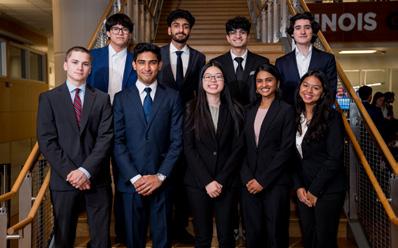
Johnson County Innovation Center Feasibility Study
University of Illinois Extension worked with Johnson County 2000 Inc., a local not-for-profit, to hire GIES College of Business students from University of Illinois to complete an Innovation Center Feasibility Study. The Johnson County Innovation Hub is an incubator set to be built in Johnson County for the purpose of catalyzing economic growth and alleviating food insecurity in the region. The primary purpose of this innovation hub is to provide infrastructure that allows for economic growth in the area across a multitude of industries, including but not limited to food banks, local educational institutions, and small businesses. In order to access grant funds for the innovation center, a feasibility study had to be completed. Illinois Extension served as the intermediary between the campus and community to fulfill the need.
One Shawnee was established in 2020 as a community development organization to revitalize the Ohio River and Shawnee National Forest from the southernmost regions in Illinois for cultural and economic needs. A regional summit was held at Vienna High School to help area leaders make positive changes for their communities. The summit focused on three main areas: connect, inform, and empower. University of Illinois Extension lead many of the training sessions, along with the promotion and marketing of the event for the organization.

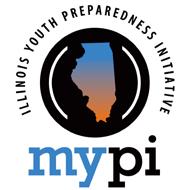
MyPI is a national program educating youth for disaster preparedness learning how they can help their communities during a natural disaster. Once course has been completed, youth are able to help organize relief efforts within their community. Students from Joppa, Vienna, Metropolis, and Pope County participated in this program.
University of Illinois Extension is an integral part of bringing education to the communities we serve. The graph represents the distribution of dollars as a percentage of total revenue for Alexander-Johnson-Massac-Pulaski-Union Counties collected during the 2023 fiscal year. The commitment of local funds by our county governments and Extension administration have allocated more federal funds allowing current staff to lead and develop multiple innovative programs, increasing the reach into our communities.
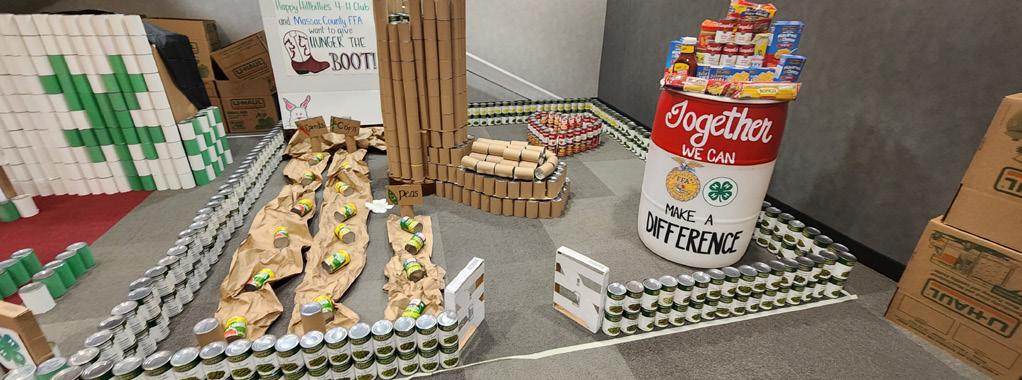
Spanning across eight weeks during the summer, Community Outreach Workers reached over 100 youth in the five counties through Illinois Junior Chef, a Supplemental Nutrition Assistance Program. Youth learned basic skills used in the kitchen, how to read, prepare, and cook recipes. Coupling this program with MyPlate, youth also learned the importance of a healthy, well-balanced meal.
SNAP-Ed collaborated with 4-H youth development and natural resources, environment, and energy teams to provide some of the ingredients from the recipes taught at Illinois Junior Chef and garden take-home kits so youth can start growing their own produce, increasing their ability for food access.
At the end of Illinois Junior Chef program, youth were given some cooking utensils and a cookbook so they could cook the recipes for their families.
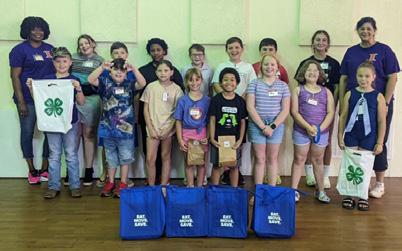
Canning workshop
Canning is one way to help families preserve their fresh produce throughout the year. Mary Liz Wright, nutrition and wellness educator, hosted a canning workshop educating community members on the equipment needed, the different methods available, and the steps to can produce safely.
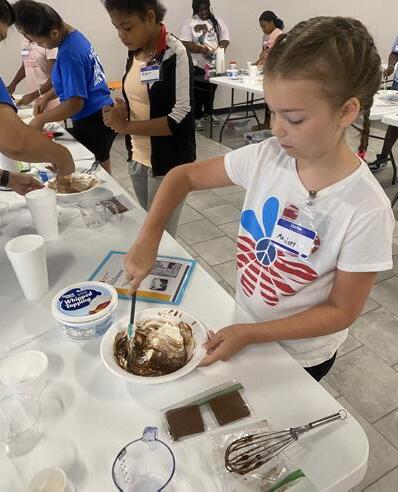
Building for Can Construction
Can Construction is a creative way for 4-H members to contribute to food access while showcasing their creativity and art innovation. Eleven 4-H clubs across the five counties collected 5,490 canned goods for Can Construction, resulting in over 24,000 servings of food provided for people in need. The members collaborate and build their designs from the items their club collects or contributes. This project combines food access, community service, competition, and our visual arts project area very well. The designs were built and displayed at Shawnee Community College for the public, who voted and selected a People’s Choice award winner. All items collected were counted, organized, and boxed by 4-H families and donated to local food pantries across the five counties.
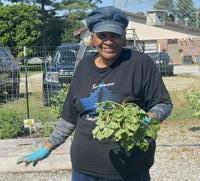
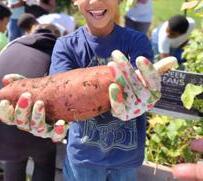
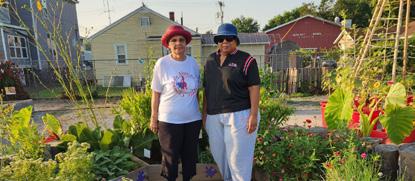
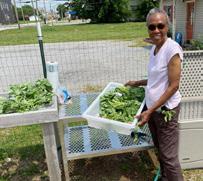
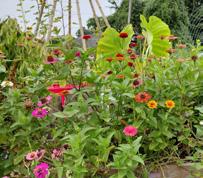
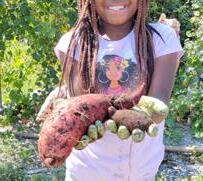
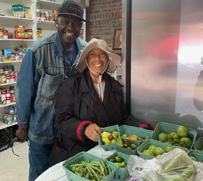
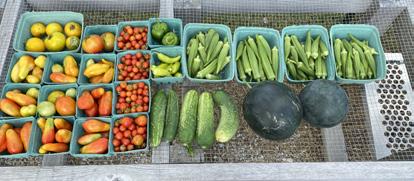
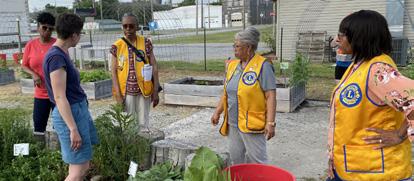
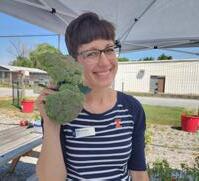
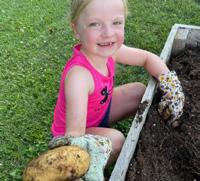
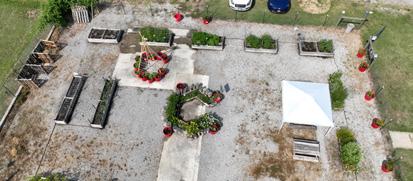
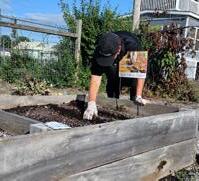
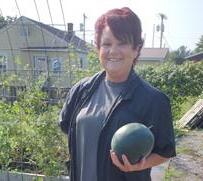
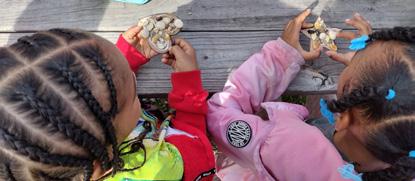
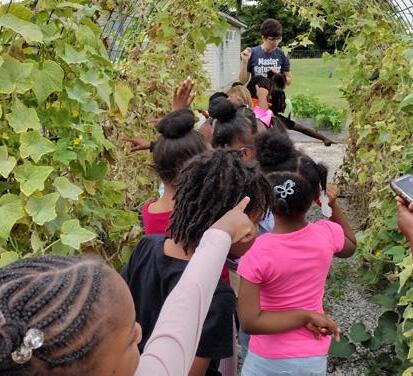
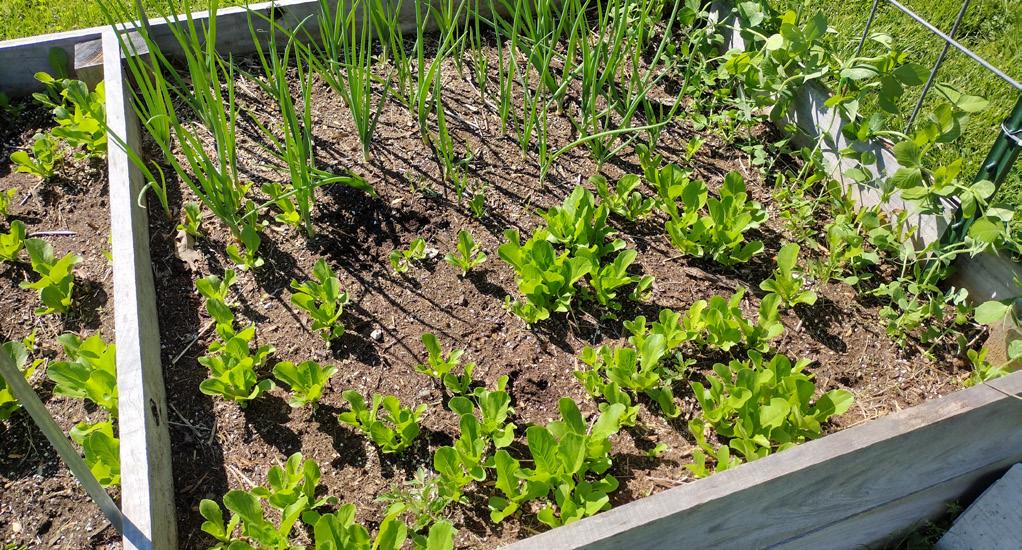
Access to fresh fruit and vegetables is not guaranteed for the residents of our five counties. Through two food donation gardens, Extension is working to increase access to this fresh produce. Over 1,500 pounds of food was grown and donated this year.
The Pilot Garden returned for its third year of growing. Community volunteers donated over 400 hours tending to the garden, with 950 pounds of produce grown and donated to Daystar Community Program. This year, tomatoes topped the scales, with 275 pounds being grown. New this year in the garden were snap and snow peas, mustard greens, and onions as additional choices for food pantry clients.
Monthly open house events from May through September introduced the community to the garden and equipped visitors with tips and tricks to try in their gardens. The open house events reached 75 people this year. During Garden Tales, pre-K through sixth grade Cairo Elementary students visited the garden to learn about a nature-themed topic, listen to a story, complete an activity, and work in the garden. Between 75 and 165 students attended each month.
In our fifth year of growing, we brought in several new families and volunteer groups to the Plant a Row, Watch COPE Grow garden. Volunteers gave 180 hours of time, growing 590 pounds of produce for COPE Food Pantry.
950 Pounds of produce grown
400
Volunteer hours recorded
Over $12,700
Value of volunteer time
590
Pounds of produce grown
180
Volunteer hours recorded
Over $5,700
Value of volunteer time
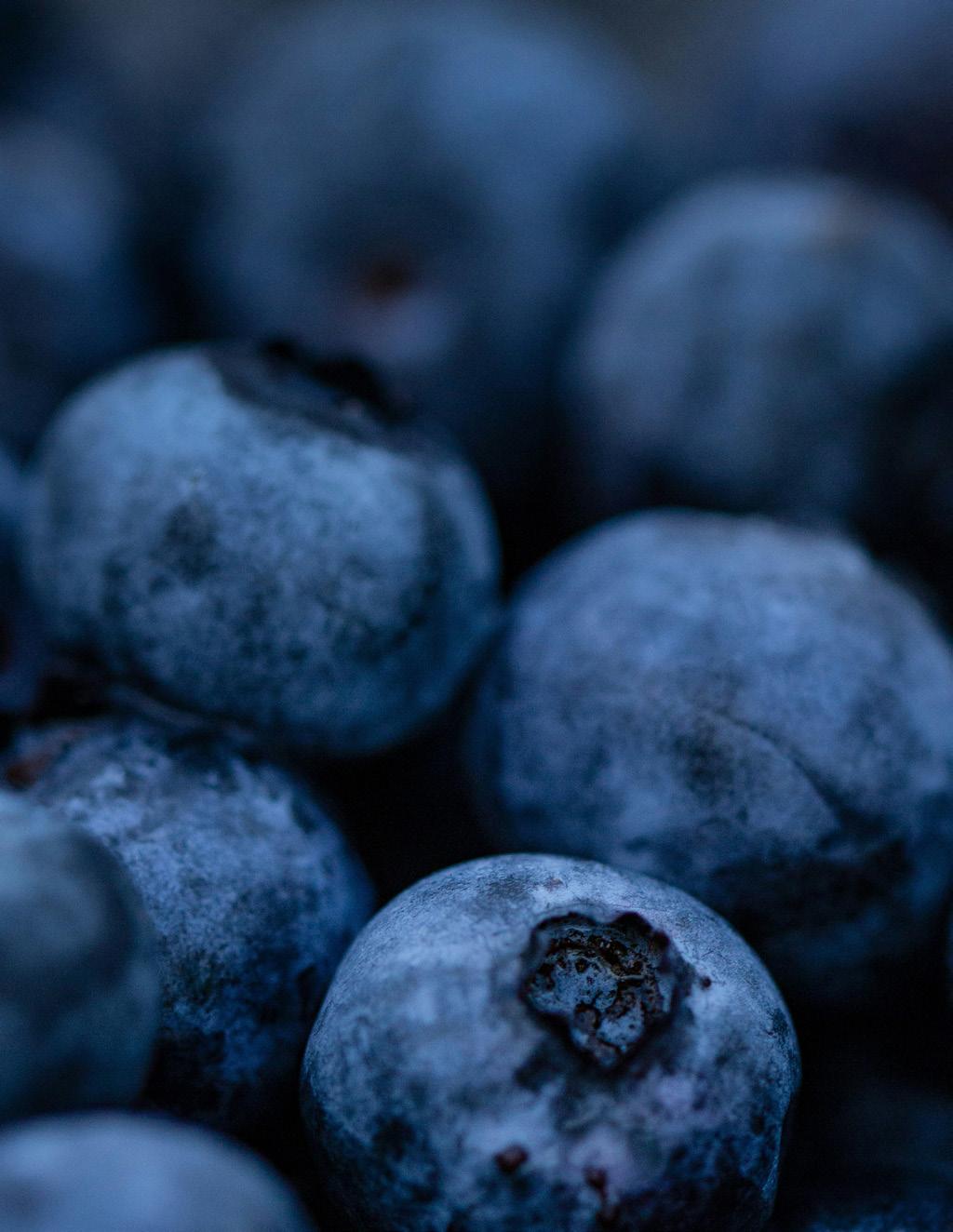
History has been made! We’ve been a food desert for a while so I’m happy to have this store to be able to purchase things that I need. It’s a wonderful feeling not to have to drive 20 miles or more to get groceries.
Trina Mayfield, Cairo Resident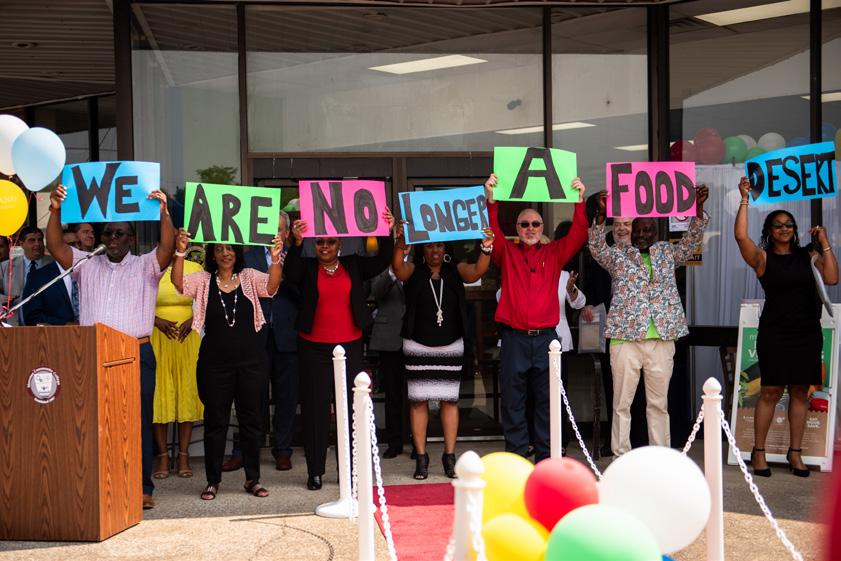
The last grocery store
in December 2015, leaving residents in a food desert with no retail option for fresh food. With significant consultation and technical assistance from University of Illinois Extension and the Illinois Institute for Rural Affairs at Western Illinois University, a group of citizens from diverse backgrounds came together in the spring of 2022 to form a committee to create a community-owned store. The group began meeting weekly in May of that year and soon had developed by-laws, policies, filed articles of incorporation, drafted a business plan and sought grants to launch the Rise Community Market Co-op. By the fall of 2022, the Co-op began selling memberships and shares of preferred stock to raise additional capital.
Through the work and dedication of over a dozen volunteers, along with more than $700,000 in grants and gifts, Rise Community Market opened to the public on June 16, 2023. The store is a 4,500-square-foot fresh market carrying fruits and vegetables, lean meats, dairy and other nutritious staples that were previously unavailable in this community of 1,600 people. The grand opening was attended by well over a hundred citizens, along with Illinois Lieutenant Governor Juliana Stratton who praised the community for its effort to end its status as a food desert.
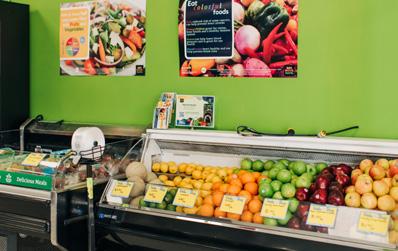
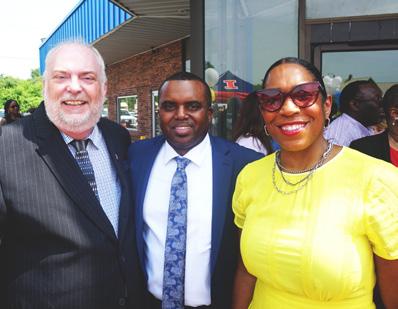
Food on the Move
Working with friends at Tri-State Food Bank, the Health Equity Achieved Together (HEAT) team and SNAP-Ed launched the Food on the Move mobile food pantry pilot program in October after many months of planning. Food on the Move will serve two communities monthly during the pilot year, with pop-up distributions to be added as the project takes shape.
Staff and volunteers, including Vienna High School students, stock the truck and trailer at the Tri-State Food Bank Andy Sisulak Cold Storage warehouse in Vienna, where the vehicles are housed. Fresh items are loaded at the warehouse, while shelf-stable items are stored and loaded at Arrowleaf’s administrative building and driven by a dedicated volunteer.
Tri-State Food Bank, Illinois Extension, and community volunteers successfully implemented the first mobile pantry event in the area at Ullin First Baptist Church, serving 50 households and over 130 individuals while distributing more than 1,800 lbs of food. Guests were able to shop the clientchoice mobile pantry, choosing a variety of nutritious foods for themselves and their families, including dairy, proteins, grains, and both canned and fresh fruits and vegetables. Extension staff provide guidance, training, and technical assistance to the program, but the volunteers truly lead the efforts at these events, serving as the pantry “staff,” promoting the events, and helping refine operations. Feedback from the community and volunteers has been overwhelmingly positive, as they are excited and grateful to have this service offered in their community. Efforts will continue to collect feedback and other data for continuous improvement and with a goal to support the sustainability of the project moving forward.
Healthy recipes, nutrition education and resources, and recipe samples are provided at each event and throughout the pantry.
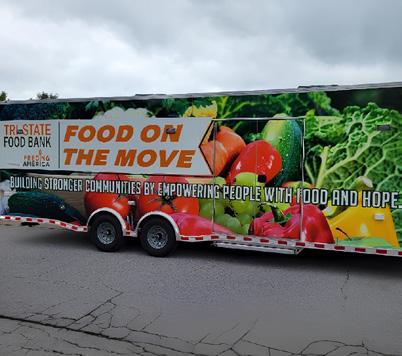
Cobden School District completed the share table project implemented throughout the 2022-23 school year. Educator Lizz Cooley-Questelle and Program Coordinator Lacey Barnhill worked alongside school staff to provide training, technical assistance, student orientation, and site observations. “Share Table” describes how uneaten food items may be collected for students to receive extra helpings, cut down on food waste, reduce food costs, and conserve natural resources. The school, using funds from the project, was able to purchase new equipment for its share table program, supporting its success. This project also piloted toolkit materials, leading to a final Share Table Toolkit to be shared with schools across the region and state.

SNAP-Ed partners with ISBE and local partners, including the Illinois CATCH onto Health Consortium and Southern Illinois Healthcare, to provide regional training for schools. Three regional trainings were held to support and engage school nutrition and wellness professionals, ranging from frontline workers to school administrators, while earning USDA Professional Standards credit. Participants learned best practices for food service and meal planning during the programs. This year’s topics covered school wellness policies, wellness policy assessment, reducing food waste, flavor stations, meal basics, administrative reviews, local food purchasing, and engaging students in school meals. Updates from local partners were also included. An average of 60 professionals attended each event, enjoying a full day of learning, resource sharing, and networking.
It was precisely what everyone needs to hear. It gave us step by step guides. She is always a text or email away to help us through any question. Program Participant
Farm Bill
County Director Jody Johnson spoke during the Farm Bill listening session held by Congressional House Chair “GT” Thompson and Representative Mike Bost in August in Effingham County. Illinois Extension and its partners utilize farm bill appropriations to deliver many programs throughout Illinois.
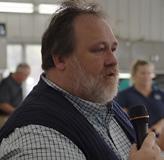
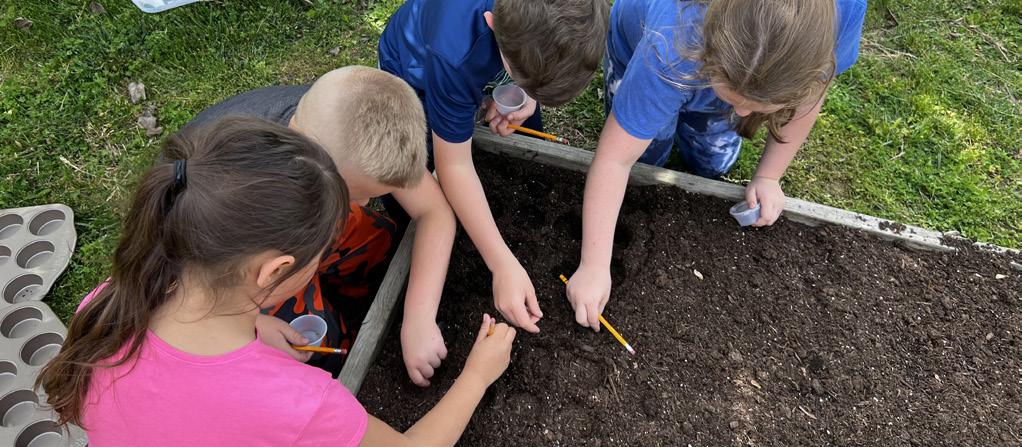
Food insecurity can affect anyone at any age, increasing their risk of chronic disease due to improper nutrition. Illinois Extension Supplemental Nutrition Assistance Program (SNAPEd) community outreach workers use curriculum designed to educate community members on healthy eating, increasing physical activity, and creating a budget for grocery shopping.
Through the Great Garden Detective curriculum provided by Illinois Extension, youth from area schools in grades three and four have learned how to garden and the importance of including fresh vegetables in their daily diet. Youth used their investigative skills and learned how a seed germinates and produces vegetation for them to taste and enjoy. Each youth was given a starter plant to take home for their family to plant and enjoy. At the end of the program, youth were provided a Great Garden Detective cookbook filled with recipes containing fresh produce that can be grown in a garden. During the program, participants were introduced to smoothies using produce that can be grown in a garden.
Thank you for making smoothies with my grandson. He asked if we could go shopping to get ingredients to make them.
Through adult nutrition education programs like Healthy Cents, participants are provided resources on how to save money at the grocery store, create healthier meals, and increase their physical activity. During the programs, community outreach workers use recipes provided by the curriculum and the “Eat. Move. Save.” website for demonstrations highlighting a better cooking experience. The adults and meal sites have started incorporating these recipes into their weekly meal plans.
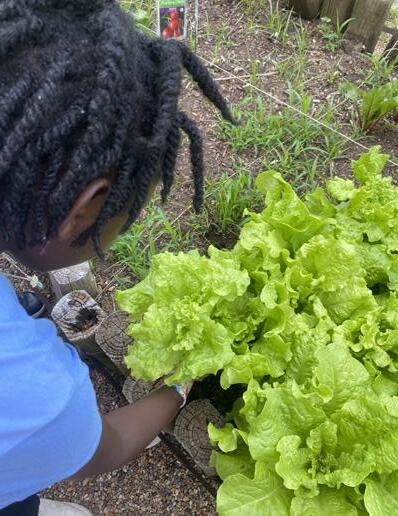
27
K-12 school partnerships
1,267 Nutrition education classes
65
Policy, systems, and environment changes adopted
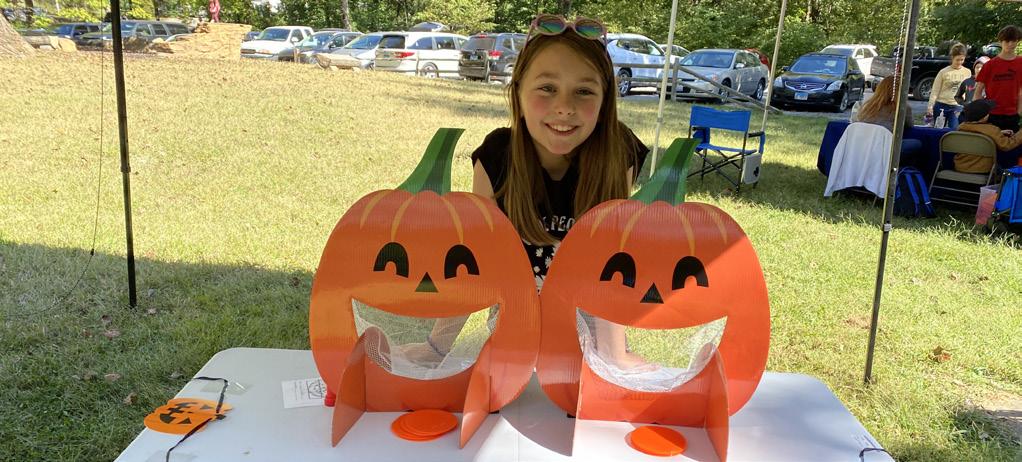
Building on the framework set up in 2022, we continued to offer family-based programming around nature-based learning for our five counties.
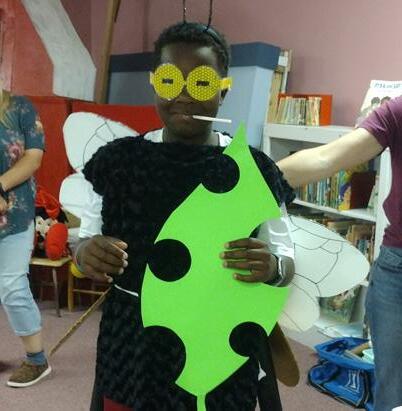
The Buzz About Bees
We expanded our library programs this year, adding four locations to our library tour. We partnered with 13 local libraries or summer camps to deliver The Buzz about Bees, an educational program for youth. Youth learned about the important role that native bees play in nature. They learned about bees while dressing up as bees and completing a craft. Parents and grandparents received resources on pollinators and native seeds to add to their home gardens. This program reached 125 youth and 54 adults at 13 locations.
Magnificent Moths
Magnificent Moths encouraged families to learn about moths during National Moth Week. Fifty-two participants visited 12 stations to learn what a moth is, how to attract them at night, what their caterpillars look like, and more. Master Naturalist volunteers and Extension staff engaged with youth while dressed up as moths.
Pumpkin Extravaganza
Offered for the third year, Pumpkin Extravaganza attracted 150 participants who learned about pumpkins through educational stations, games, and crafts. This youth pumpkin event is a collaborative effort between SNAP Education, Master Gardeners, Master Naturalists, 4-H, and the Natural Resource, Environment, and Energy team.
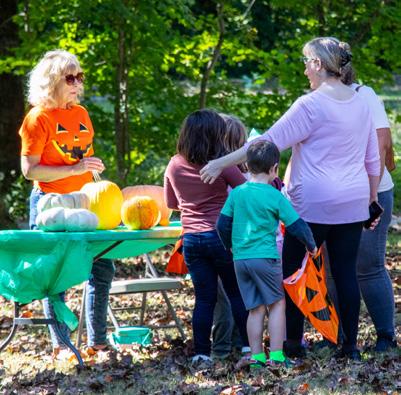
Extension Master Gardeners and Master Naturalists are engaged volunteers who participate in projects to steward natural environments and share their knowledge. This year, our volunteers came together to host a statewide conference, remove trash and invasive species from public lands, prepare herbarium specimens for Plants of Concern, sort and package native seeds, and share knowledge with others at naturethemed family events. We welcomed six Master Gardener interns.
This year, 119 Extension volunteers and staff headed south for the annual Master Naturalist State Conference to connect and gain new skills, tools, and programs.
Hosted at Touch of Nature in Makanda, the two-day event included a keynote presentation on native plants by the Illinois Botanizer Chris Benda, hands-on sessions, service projects, and regional field trips. Participants explored sessions including bird watching, plant identification, climate change, inclusivity, citizen science projects, nature journaling, a local Underground Railroad site, and more. On day two, participants chose from field trips to see migrating reptiles at Snake Road, hike Pomona Natural Bridge, tour SunnySide Acres native seed farm, canoe Lake Murphysboro State Park, or explore geological features at Millstone Bluff and Millstone Lake.
Our partnership with The Plants of Concern, a rare plant monitoring program, has been continued. An indoor volunteer opportunity for Master Gardener and Master Naturalist volunteers to prepare herbarium specimens of rare plants collected as part of the program was offered, and volunteers prepared 106 herbarium specimens, which will be cataloged at the Southern Illinois University Herbarium.
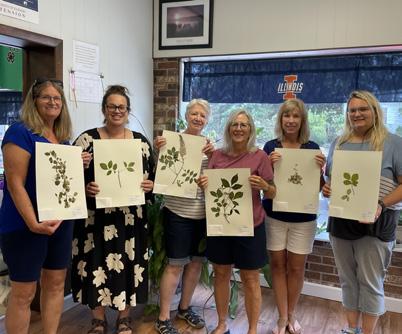
Master Naturalist recognized as an IDNR Volunteer of the Year for work at Trail of Tears State Forest
Kathy Tolson, Master Naturalist from Union County, volunteers much of her time at Trail of Tears State Forest, maintaining the trails. Her efforts were recognized when she was awarded the Illinois Department of Natural Resources Volunteer of the Year award. Each Illinois state park can nominate a volunteer with exceptional dedication to volunteerism at their site. We are so proud of Kathy’s accomplishments!
Trash buildup on public lands continues to be a problem in our five counties. Our volunteers participated in trash blasts to remove and dispose of this trash properly. Working in partnership with the U.S. Forest Service and Friends of the Shawnee National Forest led to the removal of 2,014 pounds of trash during five trash blasts.
As the message about planting native plants to support pollinators continues to gain popularity, access to native plants remains limited in rural communities. Garrett and Townsend collected seeds from native plants in the winter of 2023 and brought together Master Gardener and Master Naturalist volunteers to clean, sort, and package native seeds. Together, the volunteers prepared 650 packets of seeds, which were distributed at Garrett’s pollinator programs.
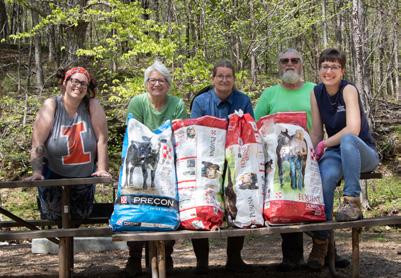
22 Volunteers
1044.6
Master Naturalist hours reported
432.31
Master Gardener hours reported
Over $44,700
Value of volunteer time
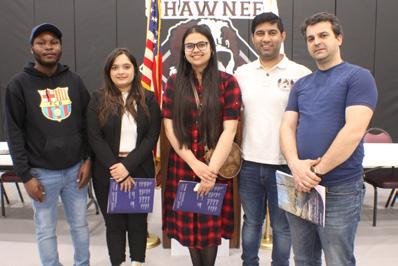
4-H proudly hosted its annual International Night and Passport to the World exhibition at Shawnee Community College. This event brought 13 clubs and over 100 4-H members together to showcase different countries from around the world, and eight of those clubs exhibited a Passport to the World group project, competing for state fair nominations. Century Teen Leader Karleigh Jones participated in her first International Night as a junior in high school.
Seeing the other teens work on projects is what made me want to participate and join 4-H! I loved going around and meeting new people while enjoying food from different countries, too.
Karleigh Jones4-H partnered with Southern Illinois University Carbondale’s International Club to bring five foreign exchange master’s and doctoral students to judge the 13 exhibitions. 4-H experiences, such as this annual evening event, promote cultural awareness and support diversity, equity, and inclusion efforts for club members, families, and community members. Youth and adults benefit from the educational opportunity of learning about other countries and trying many food samples from around the world.
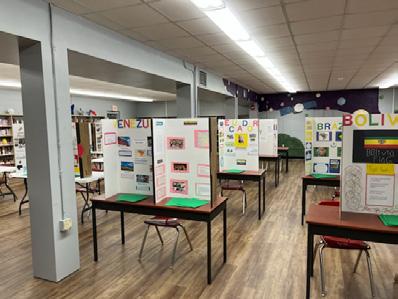
My favorite 4-H event outside of the show ring is International Night. I love trying all the different food samples and writing the outline for my club’s group presentation!
Abagayle Britton 4-H Livestock Ambassador and Villa Ridge Ag 4-H Member
In bridging our traditional and school-based 4-H programs, Shawnee School District used the Passport to the World curriculum in their school clubs as a classroom project with an individual and small group exhibition opportunity. The school highlighted their classroom program champions and reserve champions with a field trip experience to see the International Night club displays; this trip is to encourage and engage 4-H school-based programs to participate in our events outside of the school day.
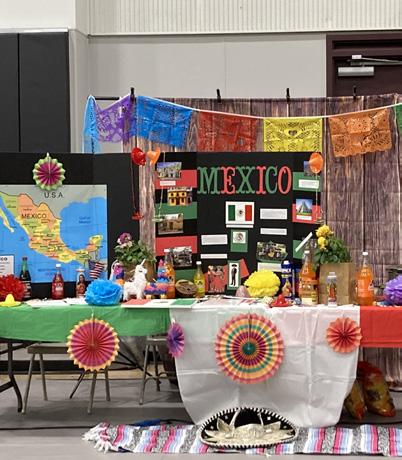
International display of Mexico
85 4-H Clubs
1,270 4-H members
699 Fair Exhibits
69 Volunteers
Twenty-three teenagers took a leap of faith and signed up for a trip to 4-H Camp in Monticello. Teens from four area high schools learned how to work together and enhance each other’s strengths and weaknesses. Youth learned how to bait a hook, row a canoe, explore mythological history, discover historical landmarks, and even participate in a food challenge where they became chefs for the day. 4-H provides experiences and opportunities youth can learn from and enjoy, from climbing a rock wall and zip lining to shooting an arrow at a 3D archery target. These are just a few of the experiences our teens were able to have. Ending the trip was a visit to the University of Illinois campus in Champaign. A college visit for high school students can really be an eye-opening experience that shapes their future. The teens were engaged throughout and eager to plan their next camp and campus trip based on their positive learning experience.
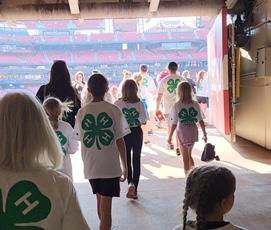
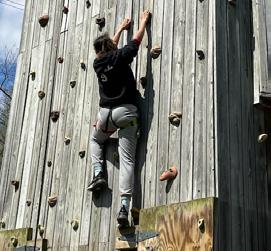
4-H Day with the Cardinals was truly a grand slam experience for local 4-H families. Over 40 4-H members represented the lower five counties at Busch Stadium, bringing fun, fellowship, and an experiential learning opportunity into an action-packed evening. The night ended with a Cardinal win and fireworks! Before the first pitch, 4-H families could take a walk at field level around the warning track and have an up-close encounter with players, see field preparations up close, cheer with Fred Bird, get autographs, and more. Touching the turf and seeing the field at ground level was a member highlight. With all families dressed in shirts and some in caps sporting the 4-H clover, it was a day full of making memories, supporting the Cardinal baseball community, and waving the 4-H flag all evening long.
Massac County 4-H members were ready to begin their livestock show day and end it with a 4-H Celebration on a hot summer day in July. However, Mother Nature had another idea. Torrential rains led to historic flooding at Massac County Youth Fairgrounds, canceling all activities for the day and emergency animal rescues as the flood waters rose quickly. Community members,4-H families, and staff teamed together to move all livestock from the flooding barns to higher ground. It was simply amazing to see how everyone came together to save the animals. But the efforts did not end there; the fair board, 4-H, and families worked together to get the fairgrounds and show ring back in tip-top shape in less than 24 hours, and the show went on. All shows were able to be rescheduled and completed, except for the horse show. Although this was a historic flooding event, the collaborative and community service efforts were phenomenal. 4-H truly does make the best better.
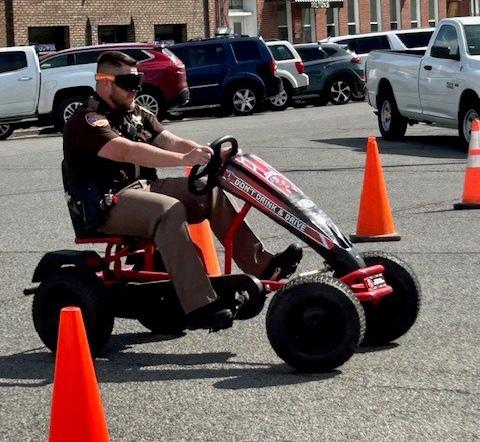
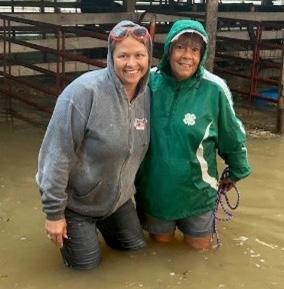
Applying 4 H’s successful Positive Youth Development model with life skill development and decision-making philosophy, young people in the program learn about the dangers of tobacco, alcohol, e-cigarette/vaping, drug use, and the permanent damage to oneself and others that can result from substance abuse. During one community event, the youth watched Deputy Blaine Crow from Massac County Sheriff’s office drive the drunk driving cart through an obstacle course. The simulation provided an example of what it’s like to drive under the influence. Weekly lessons, community events, and open communication are essential to building awareness with youth and teen mentors. Having a relationship with the Sheriff’s Department has been a beneficial enhancement to our program. Creating a space for learning and the ability to ask questions, complete with role-playing activities, are just a few reasons this curriculum is so powerful.
Jody Johnson County Director
Erin Garrett
Natural Resources, Environment, and Energy Extension Educator
Anne Townsend
Natural Resources, Environment, and Energy Extension Program Coordinator
Kristi Stout
4-H Youth Development Extension Educator
Dena Wood
4-H Youth Development Program Coordinator
Vickie Taylor
4-H Youth Development Program Coordinator
Angela Ralls 4-H Youth Development Program Coordinator
John Shadowens Community Economic Development
Destinee Sullivan Research Assistant
Massac County
Megan Henderson
Orlando McReynolds
Don Robbins
Cheryl Vanderford
James Walton
Johnson County Extension
208 E Main St PO Box 158 Vienna, IL 62995
Massac County Extension 1438 W 10th St Metropolis, IL 62960
ONLINE
facebook.com/ThePilotGarden
Johnson County
Natalie Dougherty
Amy Johnson
Emily Myrick Chesley Williams
If you need a reasonable accommodation to participate, please contact the event coordinator. Early requests are strongly encouraged to allow sufficient time to meet your needs.
Lizz Cooley-Questelle
SNAP-Ed Extension Educator
Lacey Barnhill
SNAP-Ed Extension Program Coordinator
Patsy Bishop
SNAP-Ed Community Outreach Worker
Tiffney Stewart
SNAP-Ed Community Outreach Worker
Sarita Sawyer
SNAP-Ed Community Outreach Worker
Monica Meyer
Office Support Specialist
Amy Shuck Office Support
Tami Crest Office Support
Union County
Kristen Cameron
Kendel Boysen
Ruby Lingle
Chuck Weilmuenster
Pulaski/Alexander County Extension 502 Oakley Street Mounds, IL 62964
Union County Extension
515 E Vienna St, Suite G PO Box 604 Anna, IL 62906
Pulaski/Alexander County
Josie Eason
Derek Eurales
Kelly Overhaug-Reed
Denna Williams
Ethyn Bradley
Shawnee Community College By Appointment Only
facebook.com/PlantaRowWatchCOPEGrow extension.illinois.edu/ajmpu
College of Agricultural, Consumer & Environmental Sciences
University of Illinois, U.S. Department of Agriculture, Local Extension Councils Cooperating. University of Illinois Extension provides equal opportunities in programs and employment.
The Illinois Nutrition Education Programs are funded by the Supplemental Nutrition Assistance Program (SNAP) and Expanded Food and Nutrition Education Program (EFNEP).
Issued in furtherance of Cooperative Extension work, Acts of May 8 and June 30, 1914, in cooperation with the US Department of Agriculture by the Director, Cooperative Extension Service, and University of Illinois.
©2024 University of Illinois Board of Trustees. For permission to reprint, revise, or otherwise use, contact extension@illinois.edu.